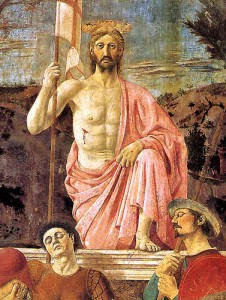For some reason I have received questions similar to this one several times, so I will drill into the matter anew… again… um…
From a reader:
Why do we say “rose again” in the Creed when Christ only rose from death once.
In the Creed of the Mass we say resurrexit. This is translated “rose again”.
Remember: LATIN is the official language of the Roman Rite. Also, our Latin liturgical texts (e.g., the Creed) is founded on Greek texts/symbols.
That said, the “again” confusion is again understandable in this age when English is devolving. If you “rise again” you must have already previously risen. Right? But we know our Lord rose only once. Right? So the translation is heretical. RIGHT?
In the Niceno-Constantinopolitan Creed we say or sing during Mass, Latin resurrexit is a compound of re– and surgo. The prefix re– conveys “again”.
In English “again” can mean more than mere repetition. Check a good dictionary of English and you will find “again” as “anew” without the concept of repetition.
In our Creed, “He rose again” means “He rose anew”.
So, resurrexit does not mean Jesus rose twice or more. He returned to life “anew”.
A reader once provided an example of a kid who falls while riding his bike. He gets up again and rides off. That “again” doesn’t mean that he repeatedly gets up before riding off. That “again” means “anew”.
“Rose again” for resurrexit is acceptable.
However, in our Latin liturgical worship we also use simple surgo, surrexit for the Lord “rose”. At Easter, and in the Octave, Holy Church sings “Surrexit Christus spes mea” in the sequence Victimae paschali laudes.
I hope that helps.



































What’s the big deal? Same as saying, “I fell and I got up again,” doesn’t imply that I’d ever fallen before.
“I get knocked down, but I get up again…”
– Chumbawamba: Tubthumping
http://tinyurl.com/yz8nptz
Pax Christi,
Jeff H.
Yup, I buy that.
Good explanation.
Folks here a bit more confused by the descent into hell . . . seems most sources explain that by saying it refers to the fact that Jesus “really died.”
We should additionally remember that the prefix “re-” means both “back” and “again.” It’s literally true that our Lord “rose back” from the dead. We say “rose again” in English because nobody ever says “rose back.”
Also, the word order in English contributes to the meaning. So “He rose again from the dead,” not “He rose from the dead again.”
So sad to see illiteracy on the rise.
Thank you for explaining this phrase. I never heard the Nicene Creed, nor any other Catholic creed, until I joined the Church as an adult. I always wondered what the “again” part meant. Illustrating it with the example of someone falling off of a bicycle and getting up “again” really made the meaning clear for me.
Thanks, Father, that really does help.
Thank you Father! Yes, of course that makes sense now.
I think the translation should be changed to anew then. For better or for worse, language changes over time (Cf. ousia and hypostasis between the 2nd-4th c.). I’m not so sure most people would say the child got “up again” from a fall, but that he got up and “tried again.” I have had many students ask this question about the “again” in the Creed. I think a retranslation may be in order.
Never mind retranslation. It’s better in Latin.
frjim4321 writes “Folks here a bit more confused by the descent into hell . . .”
Let me start by saying that I went to primary school in the 1930’s and my teachers taught me that “Limbo is a place where the souls of the Just, who died before Christ, were detained” and that since these souls were “Just” and also since heaven was not open for anyone to go to they had to go a place which was not one of punishment, but neither was it a place of glory. This place is called Limbo and, since it cannot be in heaven, it has to be in the other place….which is Hell..! So there has to be a part of hell which is not a place of punishment! This is the Hell to which Christ descended and , since heaven was just opened by his death, he took them from Limbo into heaven because they were “Just” and deserving of heaven.
In addition to the comments of Fr. Z et al, one could also get an explanation for the Creed’s “rose again” that comes straight from Scripture. There are two considerations. First, the “rose again” phrase is used by St. Paul and St. Mark: “We believe that Jesus died and rose again” (1 Thess 4:14); “The Son of man must suffer many things . . . and be killed, and after three days rise again” (Mk 8:31). Thus, the usage of “rose again” in the Creed is rooted in Scripture. Second, in order to answer the question as to why Paul and Mark used that phrase, we turn to St. Luke. Zechariah says, in his canticle, “God . . . has raised up a horn of salvation [i.e., a mighty Savior, in the order of David who was a mighty warrior, king, and prophet] for us in the house of his servant David (Lk 1:68-69). Later in his Gospel, Luke captures the reaction of the crowd to Jesus’ raising of the widow’s son: “They glorified God, saying, ‘A great prophet has arisen among us!’ and ‘God has visited his people!'” (Lk 7:16). Now we have the whole story. Jesus was first “raised up” as a prophet (in the eyes of the people), and he was later, following His passion and death, “raised up again” as the Lord God.